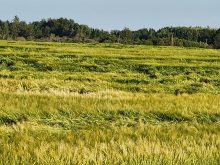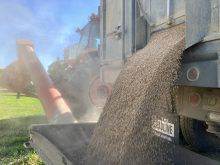Spring wheat could be the sleeper crop in 2009, according to market analyst Mike Krueger.
The Fargo, N. D.-based president of The Money Farm consulting service has told his clients to lock in diesel fuel prices, if they can, and secure spring fertilizer supplies because it could be short.
Krueger told the Manitoba Special Crops Symposium in Winnipeg earlier this month wheat prices will remain firm and could even improve.
“In my opinion the wheat market in the year ahead is going to be the real sleeper because I think we’re going to see some real dramatic changes in world supply and demand as we go forward from this year,” he said.
Read Also

Global humanitarian aid slashed by one-third
Humanitarian aid around the world was cut by a third in 2025 and Canada is one of the culprits.
There was record world wheat production in 2008, partly because record-high prices encouraged increased plantings and farmers invested in more inputs, Krueger said.
WON’T INVEST
But prices have since declined so farmers this spring will plant less wheat in favour of crops that promise a higher return. They won’t invest as much in wheat production either. The combination will result in lower world production, tighter supplies and possibly stronger prices.
Winter wheat acreage in the U. S. this year is down four million from 2008 and Krueger predicts American spring wheat plantings will fall five to 10 per cent because futures prices are better for other crops.
“I think the U. S. wheat crop could be 20 per cent smaller than it was this past year,” Krueger said.
“If we have a late, wet spring – and it’s certainly looking like that – that will push more acres (in North Dakota) away from wheat.”
Farmers in North Dakota’s Red River Valley won’t seed spring wheat later than May 1, switching to soybeans, sunflowers, barley or canola instead, he added.
American wheat acres in 2009 might be the lowest since the mid-1970s, he said.
“Re turns per acre are again back to levels where it’s (wheat) probably fifth or sixth in terms of farmers’ choice in just looking at dollars per acre,” Krueger said. “U. S. (wheat) acres have been declining steadily since the mid-’70s (until just recently).”
U. S. farmers will cut corn acres in favour of soybeans this spring because of higher fertilizer costs and a late harvest that delayed fall fertilizer applications, Krueger predicted. (Some analysts predict the opposite, saying farmers will increase corn acres because its potential yield is so much more than soybeans.)
Krueger predicted three million or four million corn acres will be switched to soybeans. If planting is delayed, more acres of soybeans will be planted. Even if only two million or three million acres go from corn to soybeans, corn prices will strengthen because world supplies of corn are not burdensome, he said.
“But remember there is that outside potential that we could have one of those big giant flip-flops where we plant six or seven million acres more of soybeans and six million or seven million acres less of corn. If that happens we’ll have a corn market that goes crazy and bean/oilseed market that gets soft.”
RAISED RENTS
Last year’s record-high prices led cash rent and land prices to jump in North Dakota. Rent, which had been $60 to $75 an acre, has jumped to as much as $145, Krueger said. And land that had been selling for $2,000 an acre can fetch up to $5,000.
“We’re still seeing where these large, rapidly expanding operators are still willing to spend a lot more money than I think a lot of those crops justify to get land,” he said.
World crude oil prices, like those of grain, have fallen from record highs, but Krueger said he expects oil prices to rebound. That’s why he tells clients to lock in as much fuel at these lower prices as they can. Some have managed to do that without having to physically take possession of it, while others have not, he said.
Almost every year there are predictions logistical problems could disrupt fertilizer distribution and most years Krueger pooh-poohs them, but 2009 could be different.
“I think the odds are pretty high that we could have some shortages,” he said.
Krueger blamed a combination of factors, including the fact that a late harvest prevented many farmers from applying fertilizer, as well as high-priced inventory throughout the distribution system and facilities slowing or ceasing production.
“All of that points to the possibility of some real spring shortages in fertilizer.” [email protected]

















